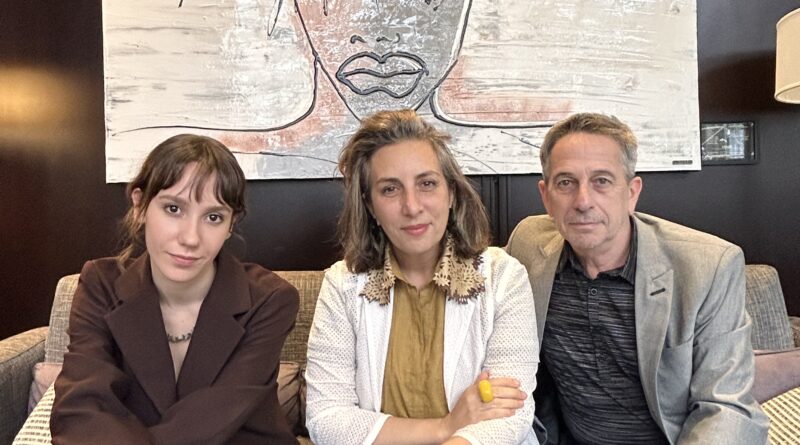TIFF 2023 Interview “Director Paula Hernández and actors Alfredo Castro and Almudena González for A Ravaging Wind”
The Extra Mile had the privilege of interviewing Director Paula Hernández and actors Alfredo Castro and Almudena González during their highly anticipated TIFF premiere of “A Ravaging Wind.” This remarkable film embarks on a captivating cinematic voyage, skillfully interlacing threads of faith, family, and profound self-discovery set against the backdrop of the remote Argentinean countryside and the intriguing Gringo’s scrapyard. Our conversation delved into the film’s inception, its intricate themes, and the actors’ profound preparations for roles requiring immense emotional depth.
Disclaimer: This interview was interpreted by a professional translator and therefore the following responses are paraphrased and inexact.
The Extra Mile (TEM): The film is an adaptation of the book El Viento que arrasa , what made you want to do on the big screen, and how did it come about?
Paula: I’ve worked before with center families that drew me into the story, and I found it interesting this time that I could work without mothers, in the previous films there have always been mothers. In this film, there are no mothers so that’s been a challenge. It’s very interesting to focus on the point of view of the young woman growing up in this very tight enclosed male-created universe. But beyond that, it was a challenge and opportunity to explore things that were new like being an agonistic person and getting to being someone from the city exploring the countryside.
TEM: The film features a great ensemble, what qualities did these actors bring to the character because there’s so much emotional depth?
Paula: The list was very short because the idea from the beginning was to work with international actors not because they were from outside Argentina, but because they made good candidates. The casting was crucial because I imagined them very differently physically, but once they started working on the first scenes, I realized this was bringing something new to the story and could add improvement in a way. In the case of the young man, they found this character who was perfect for the story. It was a very long process as we were working remotely. For the young ones, they had a coach, with a special focus on language and it was very important to the movie we were creating. Soon they were in couples, then separately, then creating the group dynamics. About the accent, because they come from different parts of Chile, Spain, and Argentina, it’s just to have the idea of a sound of an area, an area sound close to the border in the northeast of Argentina. The idea was not to erase the original languages but just to have a distortion between where they come from and what happened in that place.
TEM: The Reverand goes through a lot of changes, how do you portray the emotional and physical changes your character had to go through?
Alfredo: It was a hard shoot, the language especially because it’s almost biblical in a sense. The language was a challenge. The emotional intelligence allowed us to play in silence as well. The starting point for the character is Christ, he knows he senses the daughter is leaving him and that’s just the beginning. Then he finds a boy who pretty much becomes a reason to live, a reason to keep going with his own life. The father senses how the feminine universe is becoming on its own terms that’s why he turns on the boy.
Paula: It’s very important, as I mentioned before, the border which is very important to the film, it’s not just about limits. But like a limit on space, things are not very defining. It’s like the same with the relationship, she’s the assistant, the daughter, the very crucial woman and it’s important how things are not just singly defined. So ambiguity is crucial but it’s also expansive in a way in the movie the story, the way the plot works also in triads, and trios in a way. The dynamics, like the two of them, then the boy comes in, her finding that she needs to escape, this point of escape is very important.
Almudena: It was very interesting there was a general perspective, it was very important how from the plot of the story is very masculine, then the woman knows that she can break out of the story.
TEM: And what about you Almudena for your character Leni?
Almudena: It was very interesting how Leni the character didn’t have a mother figure or any female reference. She was in a way very lonely, but not in a weak sense. Leni had some sort of simplicity that was very attractive, not having a mother figure was a challenge but would leave wondering what that would mean or what that would feel like.
Alfredo: It was very interesting how I was describing before, how as a starting point, the Christ of a genre, he was expecting that maybe his fascination of the character of the boy could be hiding something in a way sexual, of a different orientation. But that not being in the case, and the woman becomes more and more powerful that’s why he chases towards his fascination towards this boy.
Paula: This idea of I wanted this to work, it’s not sexual abuse. He’s an abusive person in a way when it comes to how they connect with one another, how they go into the relationship, the father and son, and this idea of ambiguity.
TEM: What is the one thing you want viewers to take away from leaving the film?
Paula: For me, it’s not very defined or locked, more about opening the perspective for the audiences that connect with her. It leaves open questions for the audience about religion and themes in the film that aren’t defined. it’s having the audience complete the idea.
Alfredo: The man in a way has been abandoned, and they feel it. They believe it and that’s why in a way they are brutal in a way of the abandonment, they can not deal with.
Almudena: I expect the viewers to really leave with questions, and constantly wondering why they act or wonder and to feel that within themselves
“A Ravaging Wind” does not yet have a U.S. distribution.
A Ravaging Wind premiers at The Toronto International Film Festival on Sept 9th at 7:30pm at TIFF Bell Lightbox

